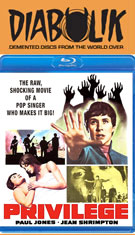

Color, 1967, 102 mins. 49 secs.
Directed by Peter Watkins
Starring Paul Jones, Jean Shrimpton, Mark London, William Job, Max Bacon
Scorpion Releasing (Blu-ray) (US RA HD), BFI (Blu-ray & DVD) (UK RB/R2 HD/PAL), New Yorker (US R1 NTSC) / WS (1.85:1) (16:9)
One of the best 1960s 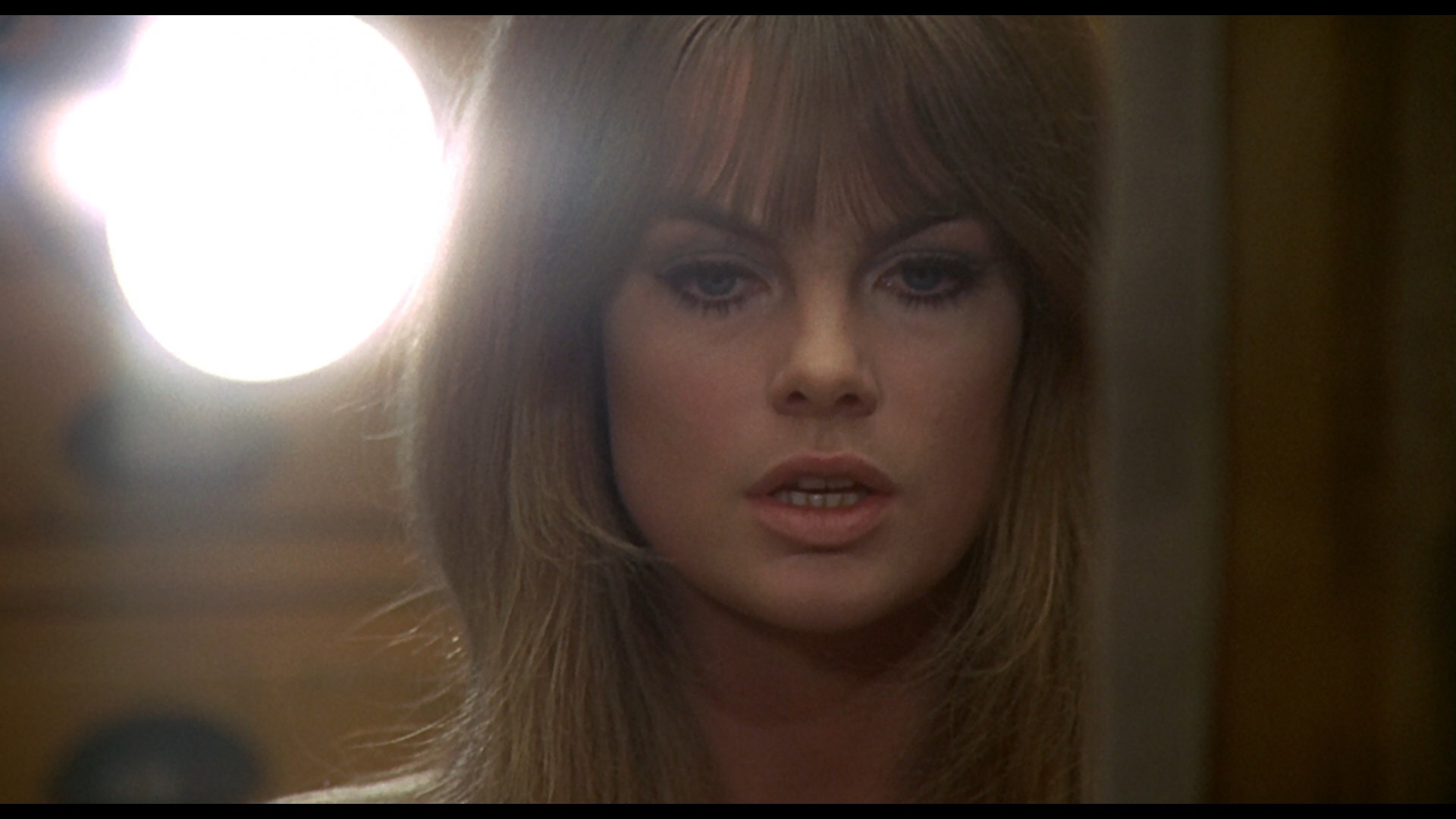 films most people haven't seen, Peter
films most people haven't seen, Peter 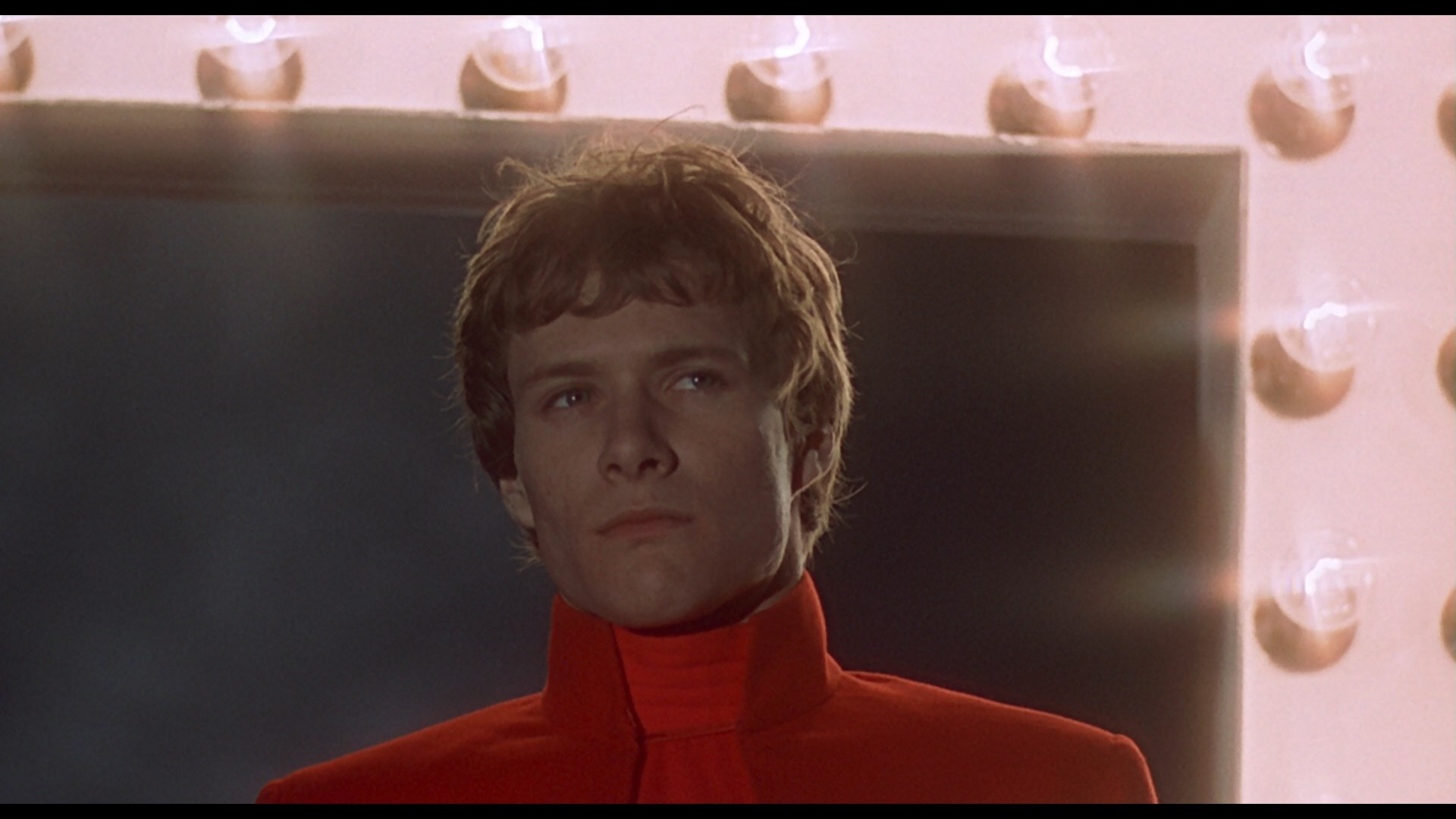 Watkins' Privilege was the first theatrical feature from the controversial director of The War Game, the infamous banned TV post-nuke "documentary." With this film, Watkins turned his eye to a story of Britain "in the near future" where a pop idol, Steven Shorter (Jones, former lead singer of Manfred Mann), holds a powerful sway over the population thanks to his elaborate stage shows which feature him hauled out of a burlap prisoner's sack and into a cell where stage police beat him savagely while he sings songs pleading for freedom. Naturally, the teenagers eat it all up, much to the delight of his hyper-efficient PR team which has managed to turn his persona into a massive commercial industry manipulated by both church and single-party state. The game starts to change when pretty painter Vanessa (real-life supermodel Shrimpton) is brought in to create his portrait only to fall in love with the battered, bruised, manufactured idol, whose misery mounts when his handlers make him the centerpiece of a nocturnal festival honoring a country-wide Christianity week meant to covert over all of his susceptible young fans.
Watkins' Privilege was the first theatrical feature from the controversial director of The War Game, the infamous banned TV post-nuke "documentary." With this film, Watkins turned his eye to a story of Britain "in the near future" where a pop idol, Steven Shorter (Jones, former lead singer of Manfred Mann), holds a powerful sway over the population thanks to his elaborate stage shows which feature him hauled out of a burlap prisoner's sack and into a cell where stage police beat him savagely while he sings songs pleading for freedom. Naturally, the teenagers eat it all up, much to the delight of his hyper-efficient PR team which has managed to turn his persona into a massive commercial industry manipulated by both church and single-party state. The game starts to change when pretty painter Vanessa (real-life supermodel Shrimpton) is brought in to create his portrait only to fall in love with the battered, bruised, manufactured idol, whose misery mounts when his handlers make him the centerpiece of a nocturnal festival honoring a country-wide Christianity week meant to covert over all of his susceptible young fans.
As with Watkins' other films, Privilege is almost queasily prescient as it looks forward to the media's use of corporate-owned celebrities to push specific political and religious agendas, an aspect many critics at the time found far-fetched. Now that pop culture has long been swamped with the bizarre sexualized/conservative mutations of endless manufactured clones, the music doesn't even matter at all; as Privilege proved, 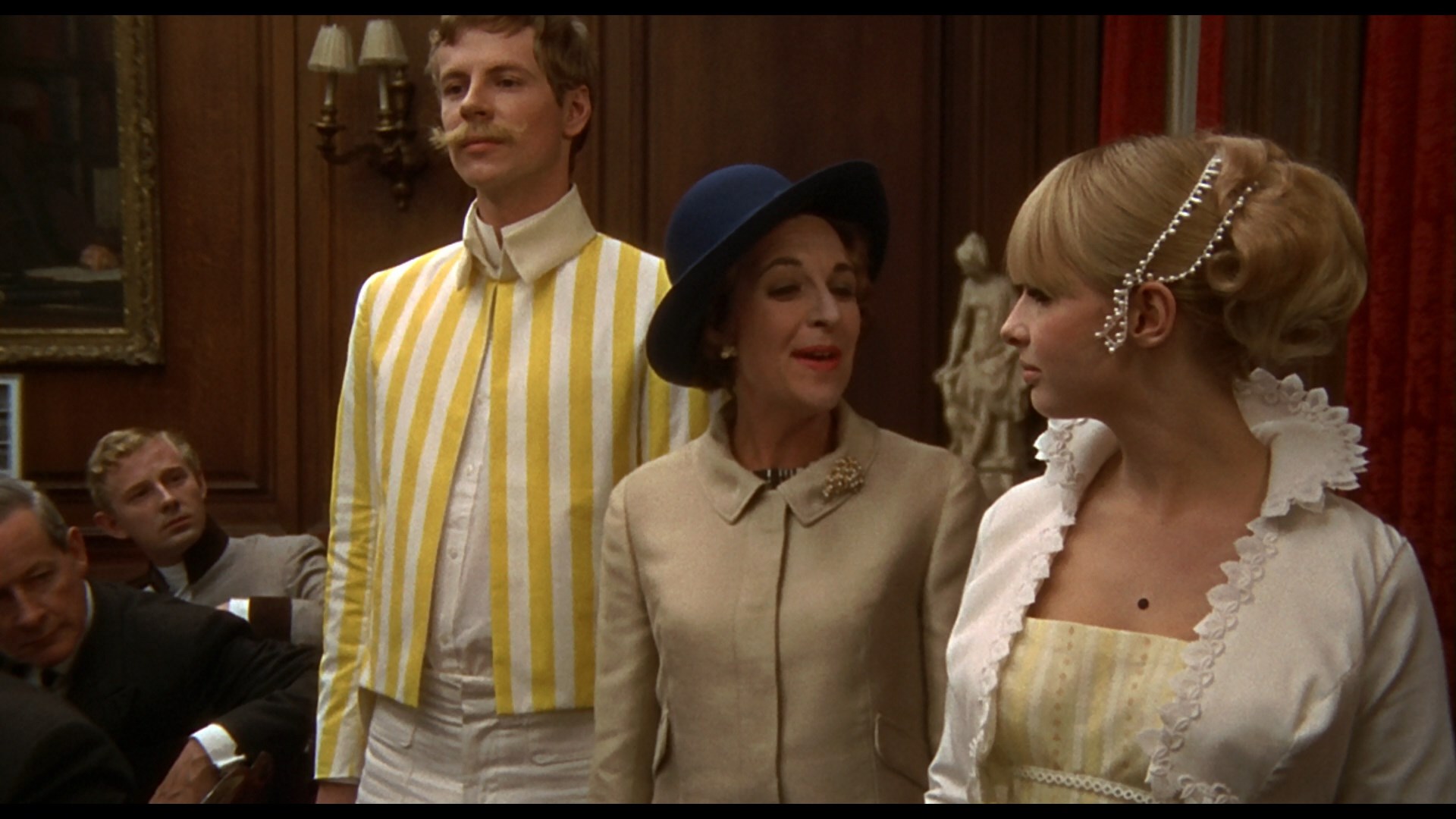 it's all about keeping young consumers in line. Watkins constructs the film as a narrated documentary (which creates a
it's all about keeping young consumers in line. Watkins constructs the film as a narrated documentary (which creates a 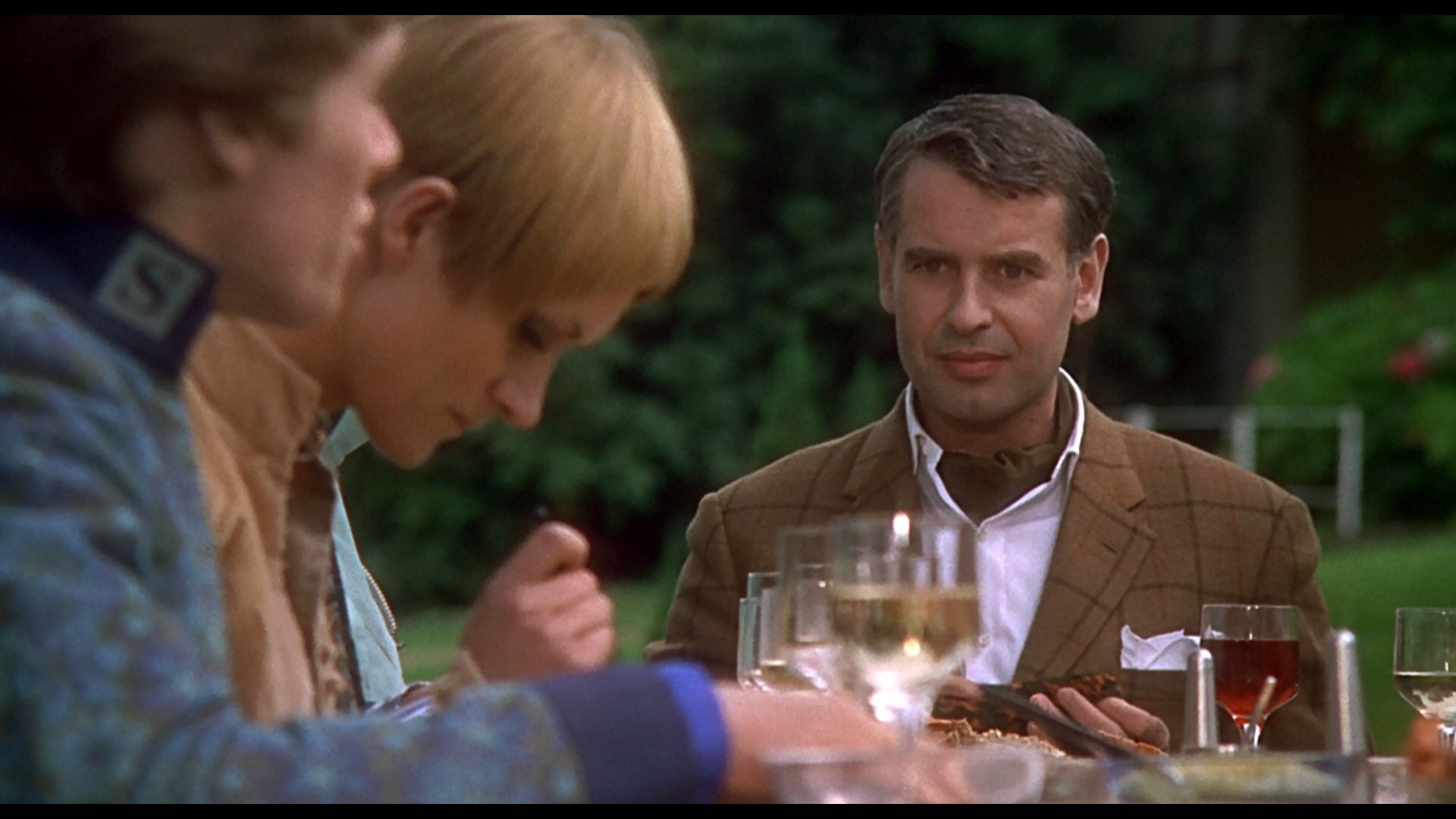 wonderful hall-of-mirrors effect for a story taking place in the future) but also unleashes a number of unforgettable, stylish set pieces, with Shorter's major performances being the standouts along with some hilariously biting television commercials. The two non-actor leads deliver appropriately low-key and sometimes awkward performances which actually work in the film's favor, and surprisingly, the soundtrack features plenty of standout pop tracks that could have been real hit singles with a bit more of a label push. In fact, if there's one quibble with the film, it's the omission of Jones' title song, one of the finest things he ever recorded, which kicks off the soundtrack LP but appears nowhere in the feature itself. Strangely enough, Jones eventually went on to become a born-again entertainer at the urging of Cliff Richard, which adds yet another layer of meaning to a film already operating on many, many levels at once.
wonderful hall-of-mirrors effect for a story taking place in the future) but also unleashes a number of unforgettable, stylish set pieces, with Shorter's major performances being the standouts along with some hilariously biting television commercials. The two non-actor leads deliver appropriately low-key and sometimes awkward performances which actually work in the film's favor, and surprisingly, the soundtrack features plenty of standout pop tracks that could have been real hit singles with a bit more of a label push. In fact, if there's one quibble with the film, it's the omission of Jones' title song, one of the finest things he ever recorded, which kicks off the soundtrack LP but appears nowhere in the feature itself. Strangely enough, Jones eventually went on to become a born-again entertainer at the urging of Cliff Richard, which adds yet another layer of meaning to a film already operating on many, many levels at once.
Whether due to its indifferent box office reception or potentially incendiary subject matter, Privilege became extremely difficult to see with Universal essentially letting it gather dust in the vault for decades along with many of the studio's other forgotten gems of the same period like Games. Nevertheless, the film's influence and cult following continued to grow over the years, particularly as subsequent musicals displayed unmistakable nods to this film such as the following year's Wild in the Streets (basically a simplified remake) and even Ken Russell's Tommy. Of course, one could argue that the real germ of this idea began in 1957 with the 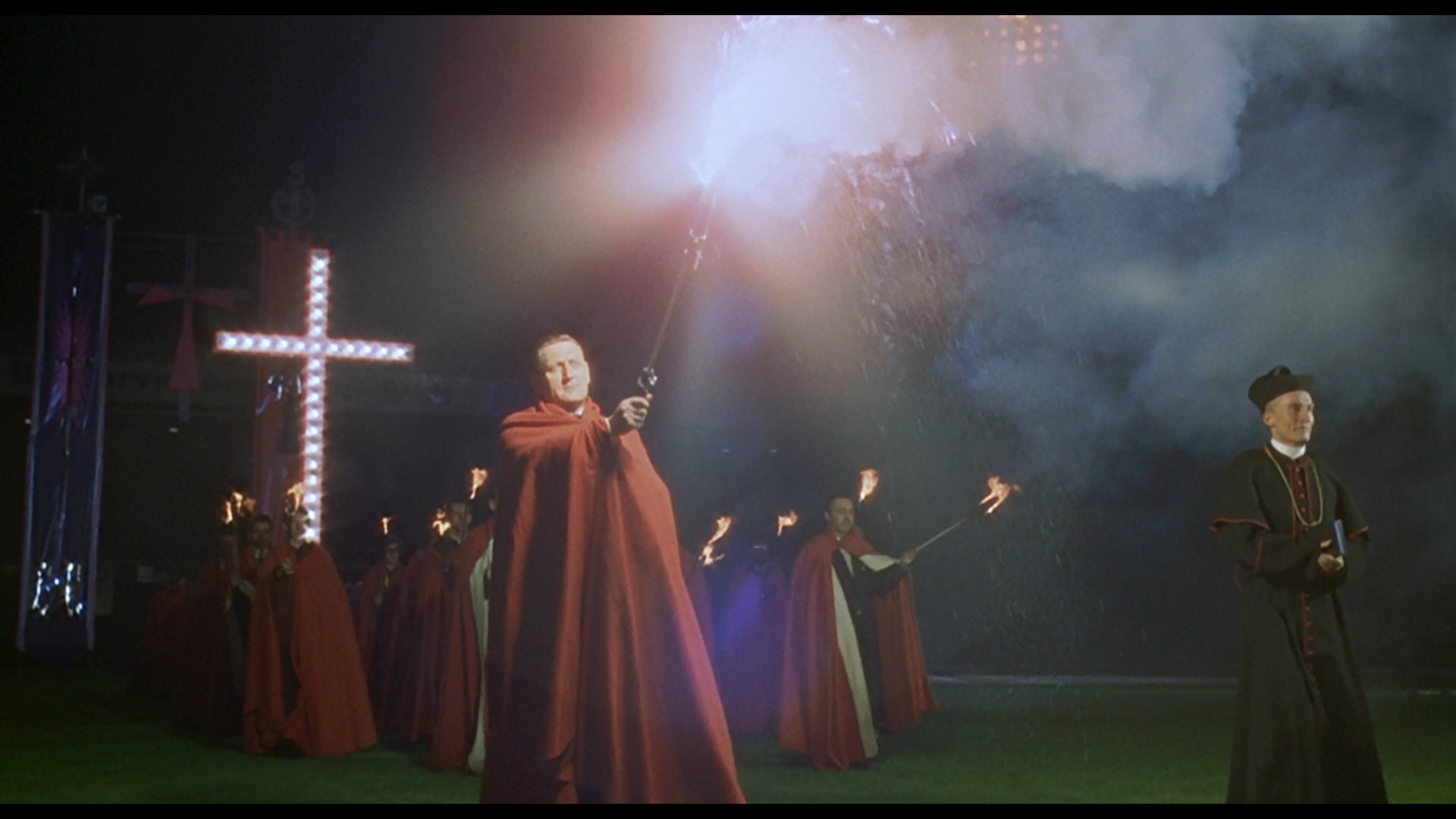 classic A Face in the Crowd, but that film's unlikely "happy" resolution makes it pale next to this film's far more ambiguous, haunting conclusion.
classic A Face in the Crowd, but that film's unlikely "happy" resolution makes it pale next to this film's far more ambiguous, haunting conclusion.
With the DVD market unleashing many of Watkins' films to widespread praise, it was just a matter of time 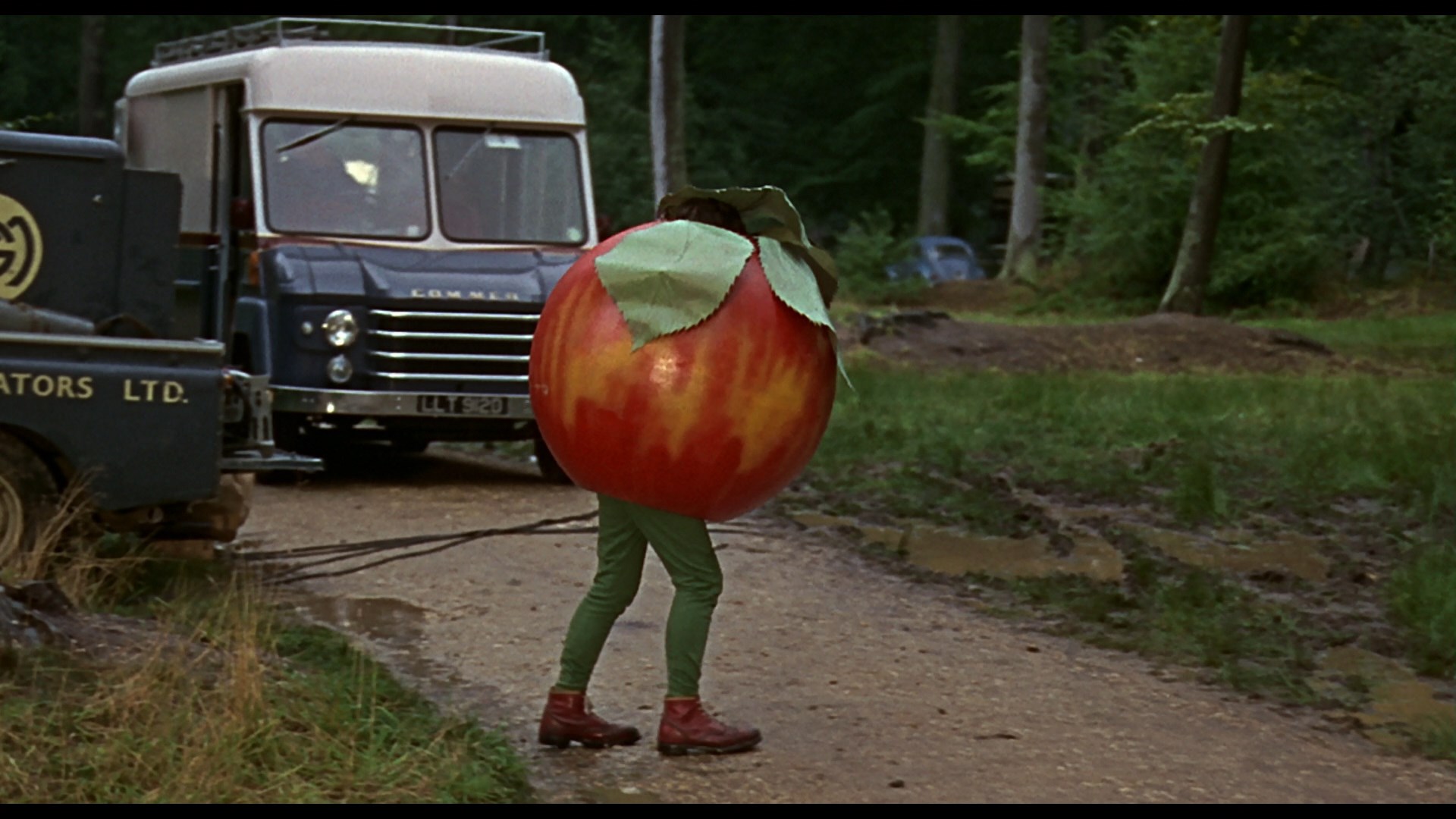 before Privilege finally appeared on home video after the studio struck a new print for retrospective screenings. In America the rights were licensed to Project X and distributed through the now-defunct New Yorker Films whose HD-sourced release looks excellent (albeit interlaced) and features some solid extras including "Lonely Boy," a half-hour 1962 documentary about Paul Anka that Watkins referred to heavily in the creation of his screenplay. Other extras include the theatrical trailer, a poster gallery, and a thick booklet containing a fascinating Watkins "self-interview" (shades of David Byrne) and two additional essays about the film.
before Privilege finally appeared on home video after the studio struck a new print for retrospective screenings. In America the rights were licensed to Project X and distributed through the now-defunct New Yorker Films whose HD-sourced release looks excellent (albeit interlaced) and features some solid extras including "Lonely Boy," a half-hour 1962 documentary about Paul Anka that Watkins referred to heavily in the creation of his screenplay. Other extras include the theatrical trailer, a poster gallery, and a thick booklet containing a fascinating Watkins "self-interview" (shades of David Byrne) and two additional essays about the film.
About a year and a half later, Privilege arrived on video in its native country courtesy of the BFI who released it as part of their marvelous Flipside series (though given the film's excellence and importance, it could have easily qualified as a standard release from them as well). Released a few months before the Blu-ray, the DVD transfer appears to be from the same HD source but this one is progressive a bit of additional cleanup removing some dirt and debris, and the extras apart from the same trailer are completely different. The subsequent Blu-ray is obviously superior, replicating the look of Universal's freshly struck prints; some very minor light edges in the film processing around some building shots could be mistaken for edge enhancement, but these inherent oddities are present in the big screen version as well. The BFI version includes two excellent Watkins short films: 1959's The Diary of an Unknown Soldier (17m3s), a portrait of a WWI fighter 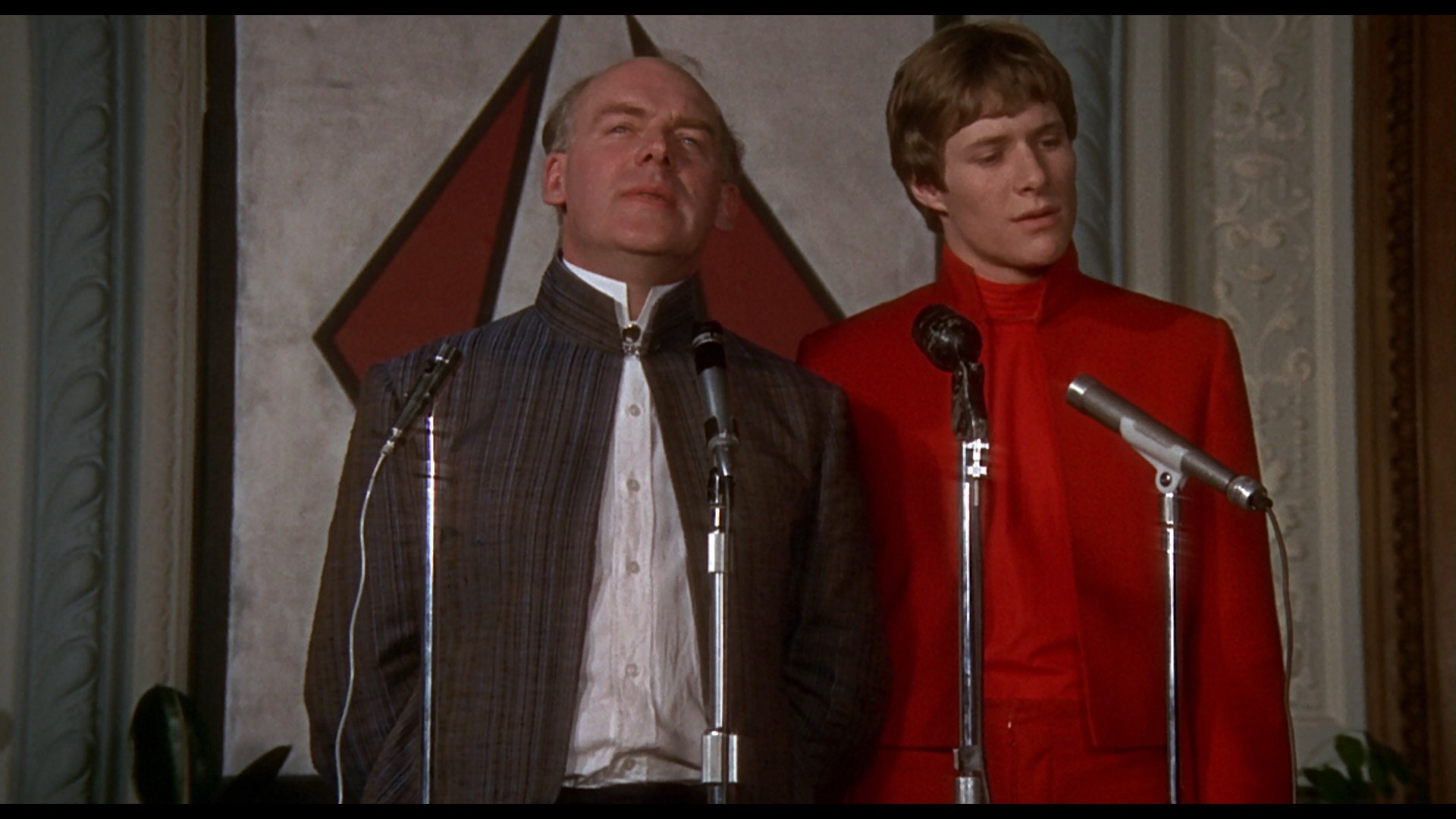 preparing to charge into the fray, and 1961's The Forgotten Faces (18m53s), a look at a major Hungarian public revolt.
preparing to charge into the fray, and 1961's The Forgotten Faces (18m53s), a look at a major Hungarian public revolt. 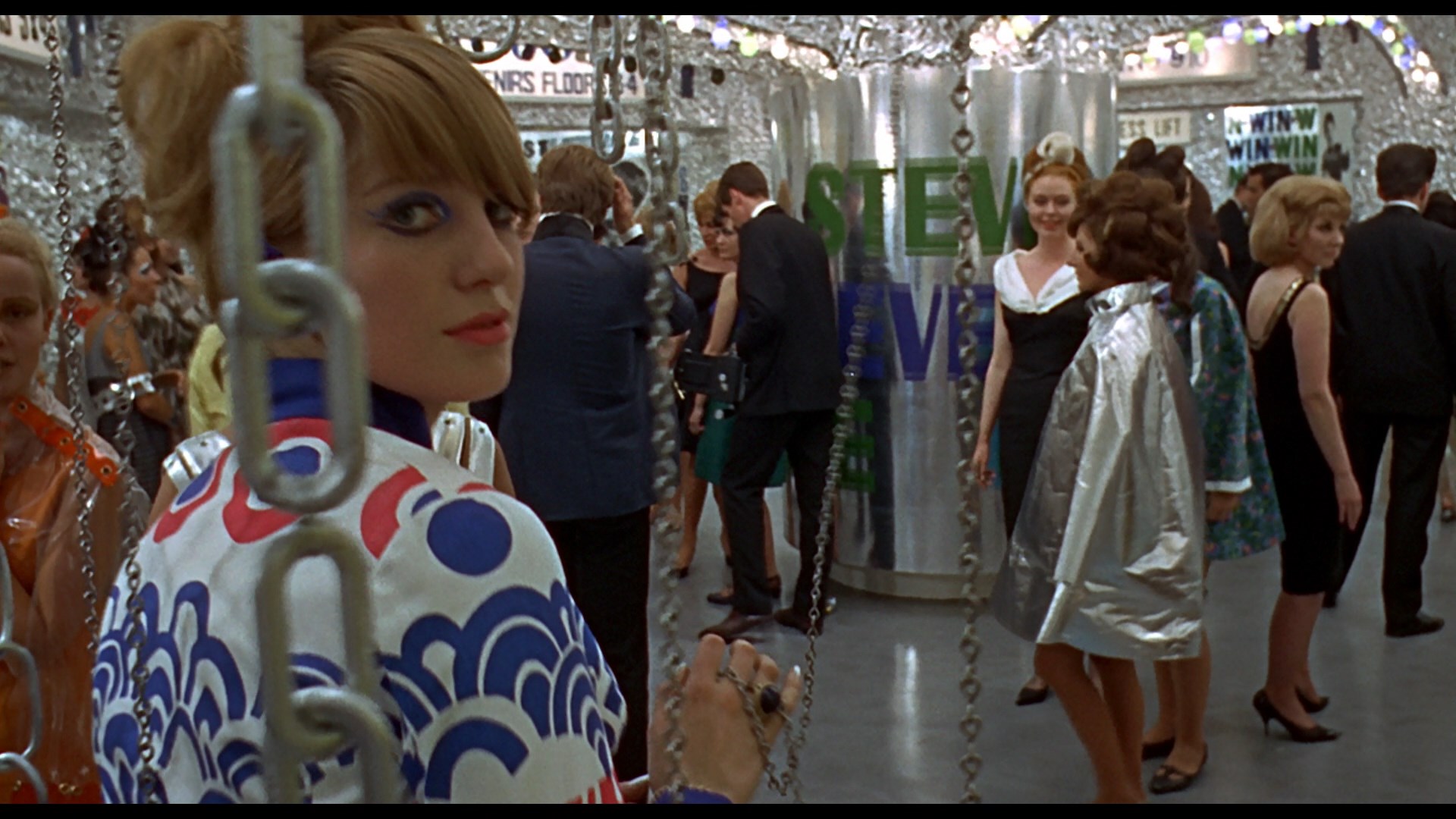 Both feature glimpses of the genius soon to come with Watkins' first two features and make for an invaluable accompaniment to the main program. Finally the UK release contains a different, 28-page booklet featuring essays by film historian Robert Murphy and Watkins expert John Cook, a Watkins overview by William Fowler, a Paul Jones bio by the BFI's Vic Pratt, and a nice smattering of behind-the-scenes photos.
Both feature glimpses of the genius soon to come with Watkins' first two features and make for an invaluable accompaniment to the main program. Finally the UK release contains a different, 28-page booklet featuring essays by film historian Robert Murphy and Watkins expert John Cook, a Watkins overview by William Fowler, a Paul Jones bio by the BFI's Vic Pratt, and a nice smattering of behind-the-scenes photos.
In 2022, Privilege finally got its U.S. Blu-ray premiere courtesy of Scorpion Releasing (distributed by Kino Lorber), well after the U.K. release had gone out of circulation. The transfer here is from the same source and looks essentially identical, which is fine considering it looked great in the first place. The DTS-HD MA English 2.0 mono track is also of the same high quality and features optional English SDH subtitles. The big extra here is a new audio commentary by Daniel Kremer, who does an adept and thorough job of outlining the film's influences and pop culture references, other connected British films of the period like The Rise and Rise of Michael Rimmer, the backgrounds of its stars, the intersection of propaganda and popular music, and lots more. Also included are the film's U.K. and U.S. trailers in HD, plus bonus ones for The Apple (which would make for a thematically relevant and completely insane double feature), Counterpoint, Cult of the Damned, Sleepless, and Strange Shadows in an Empty Room.
Scorpion Releasing
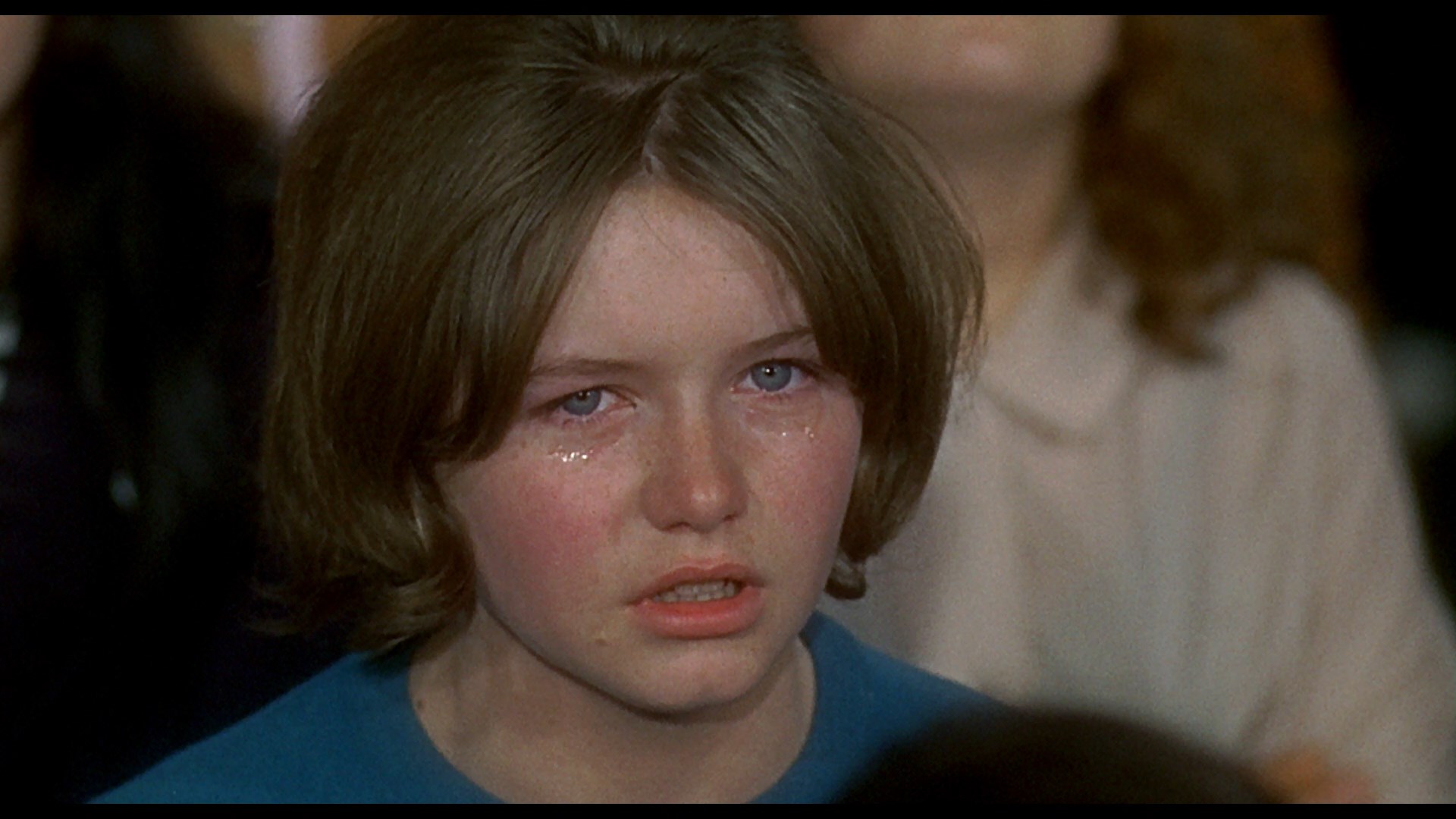
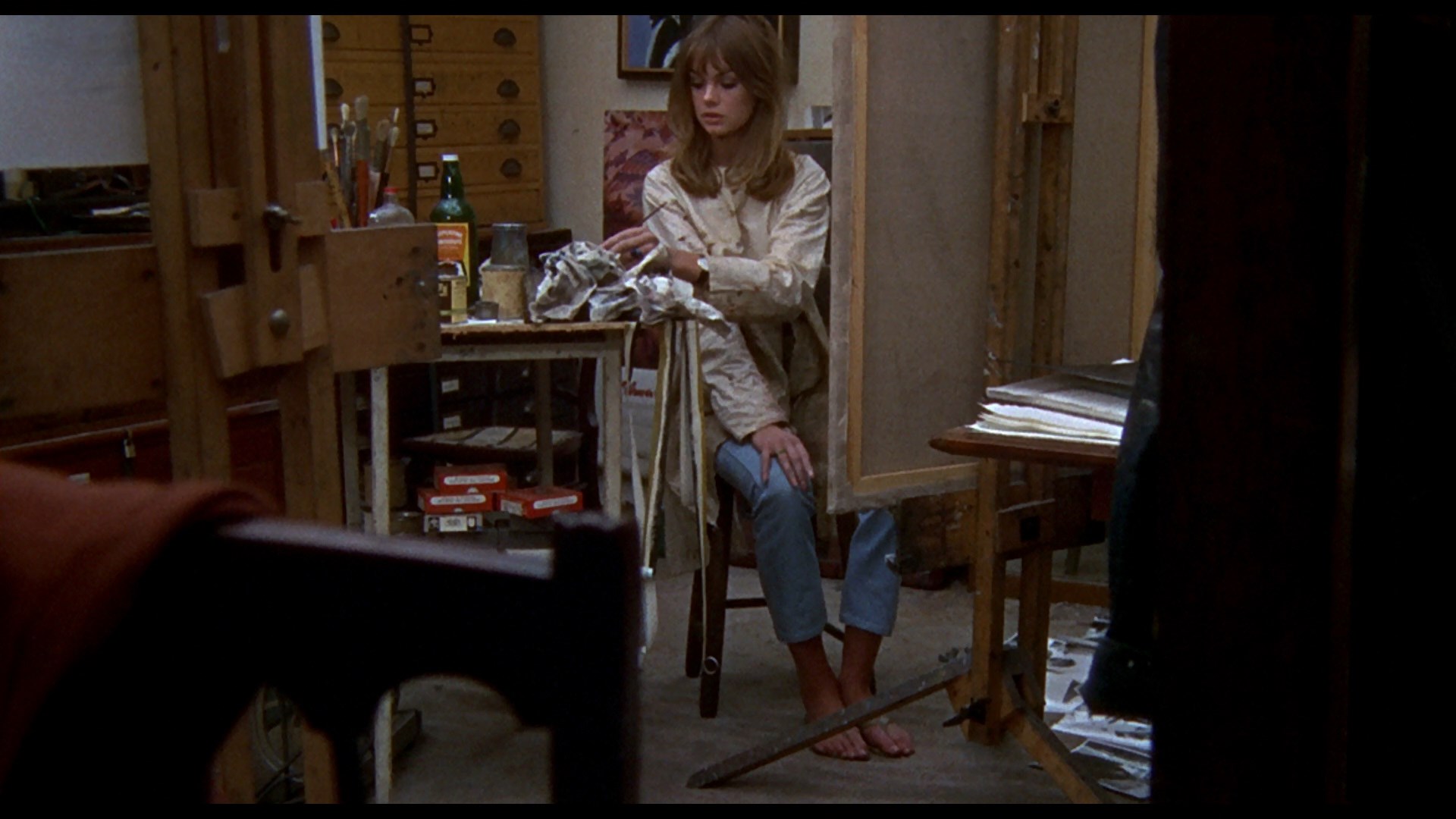
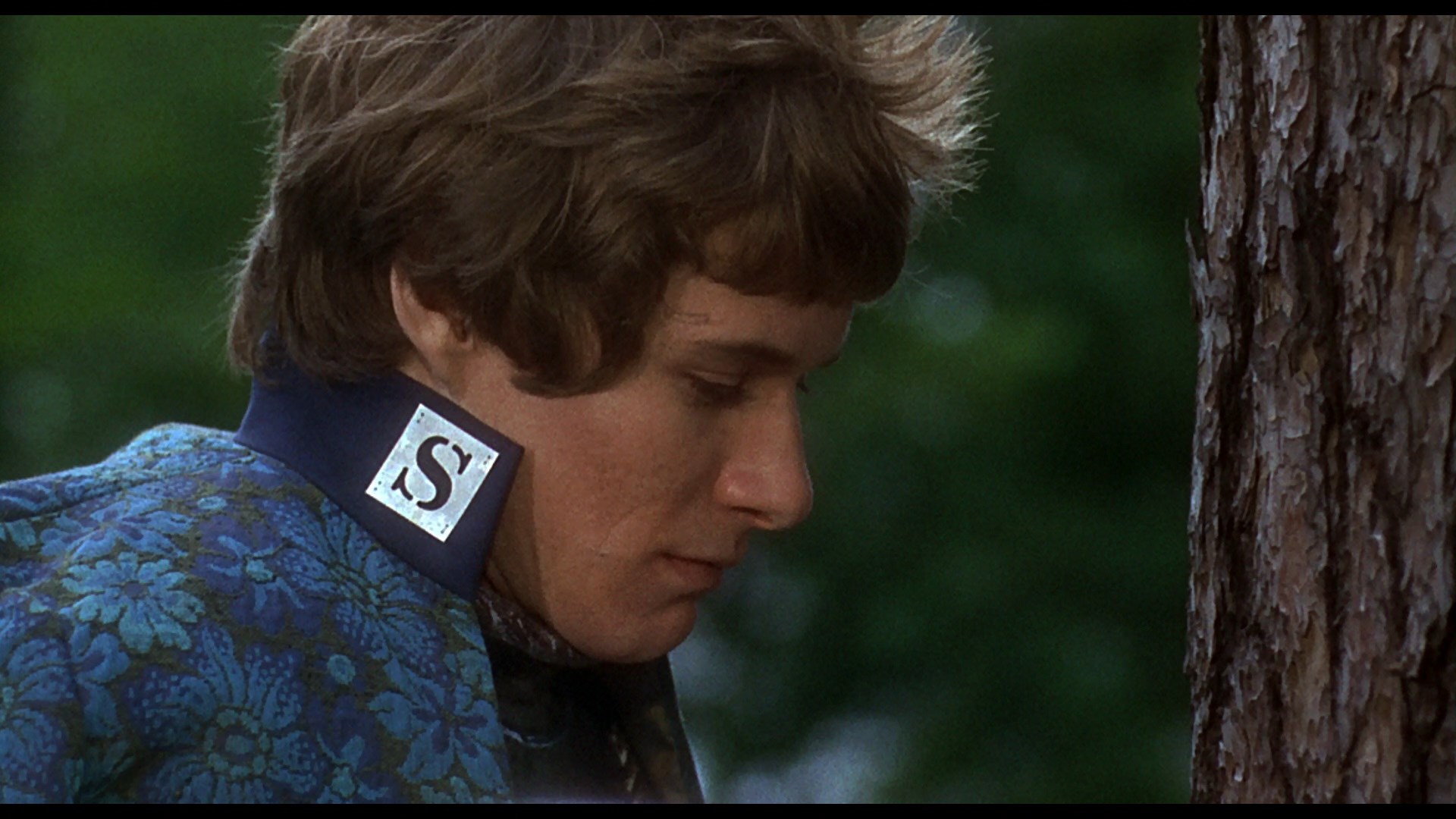
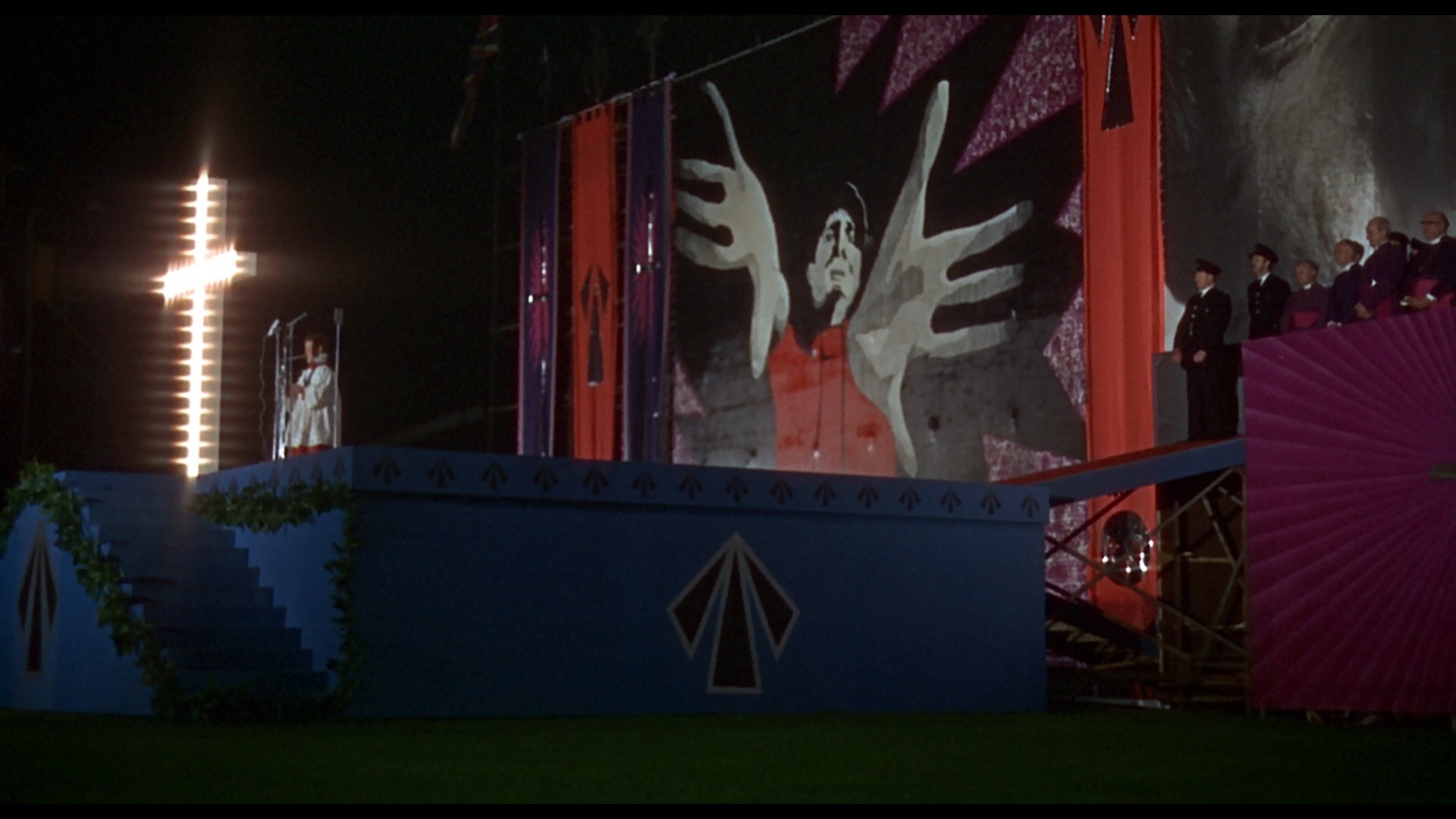
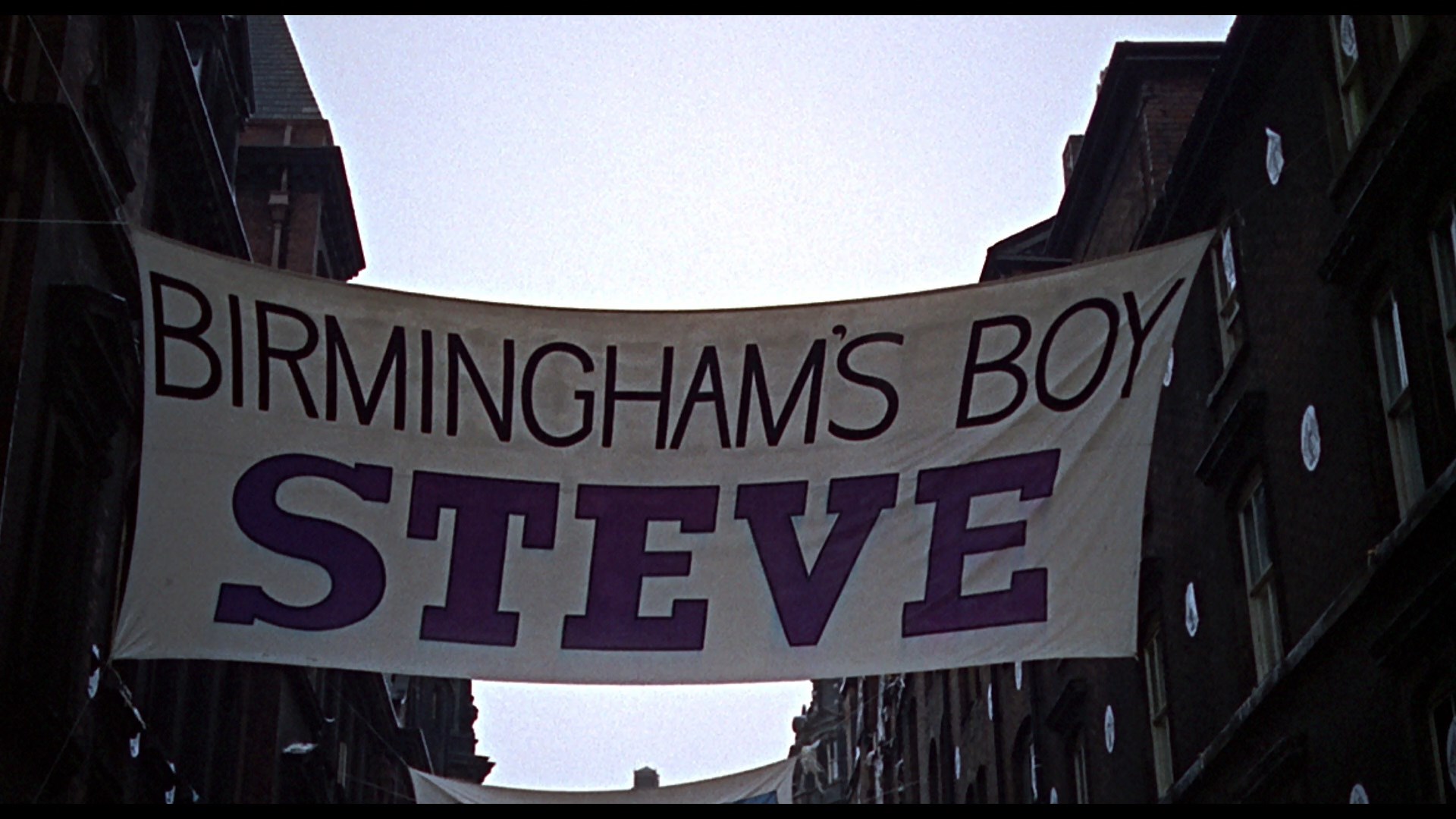
BFI
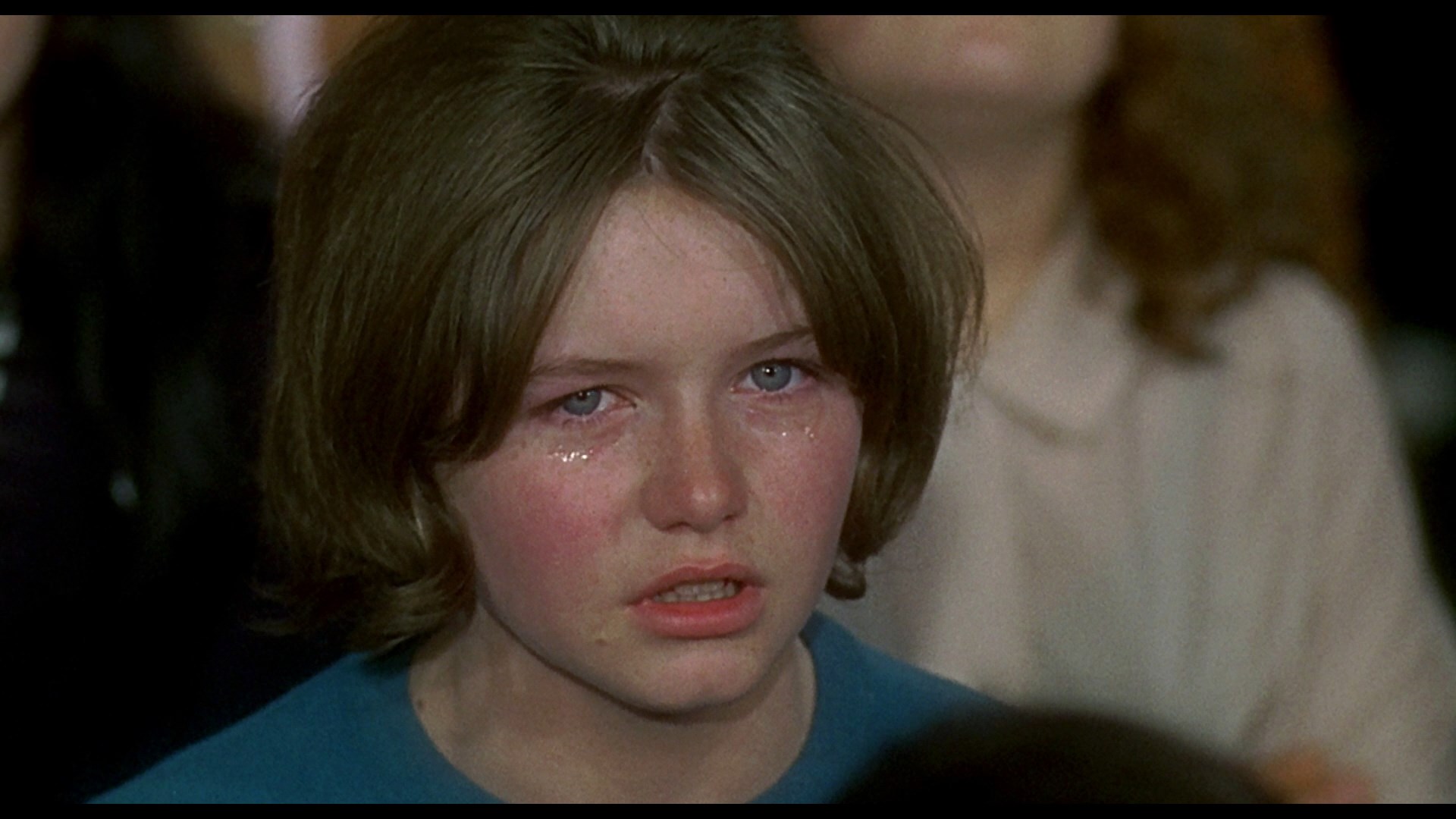
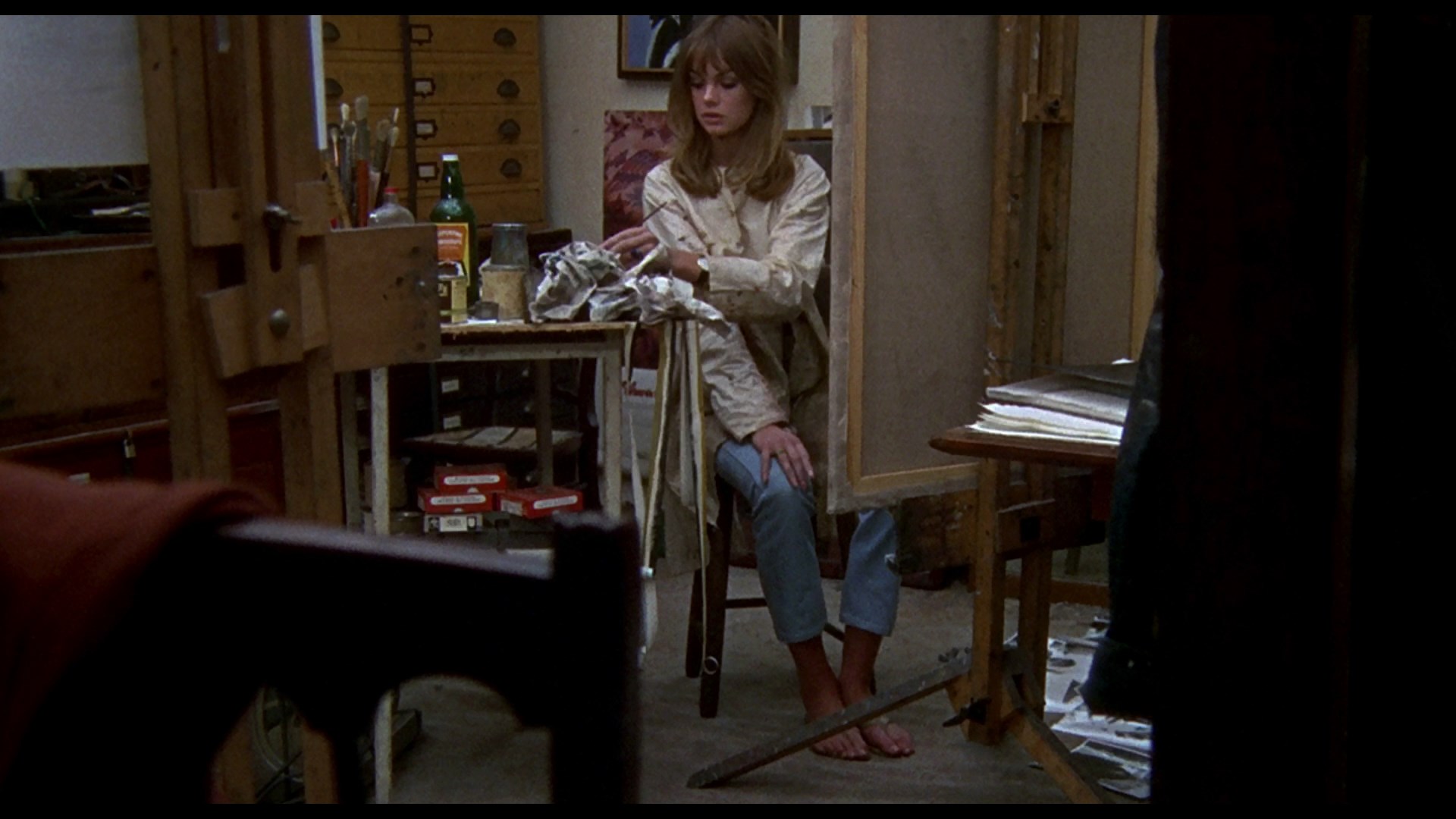
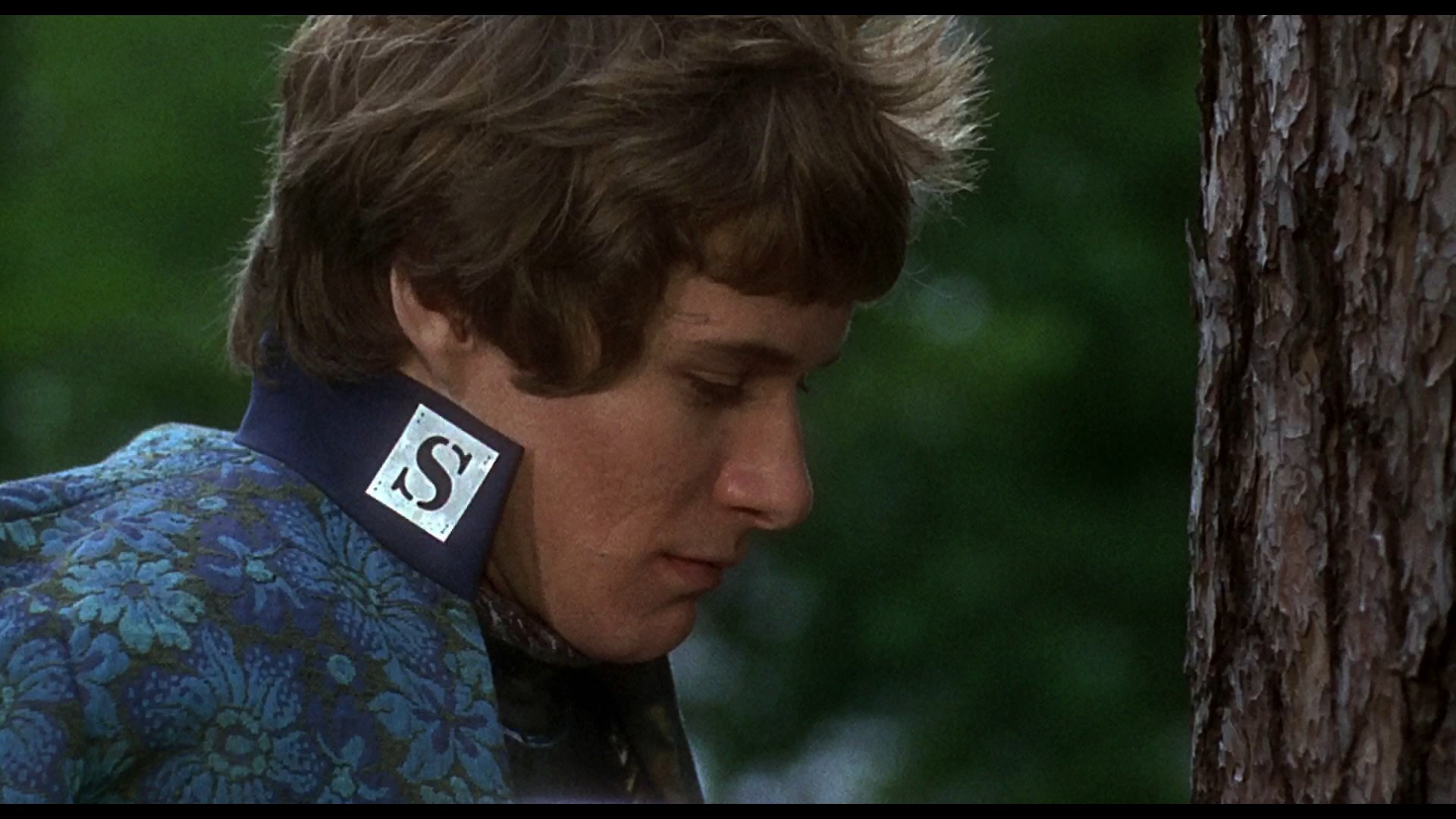
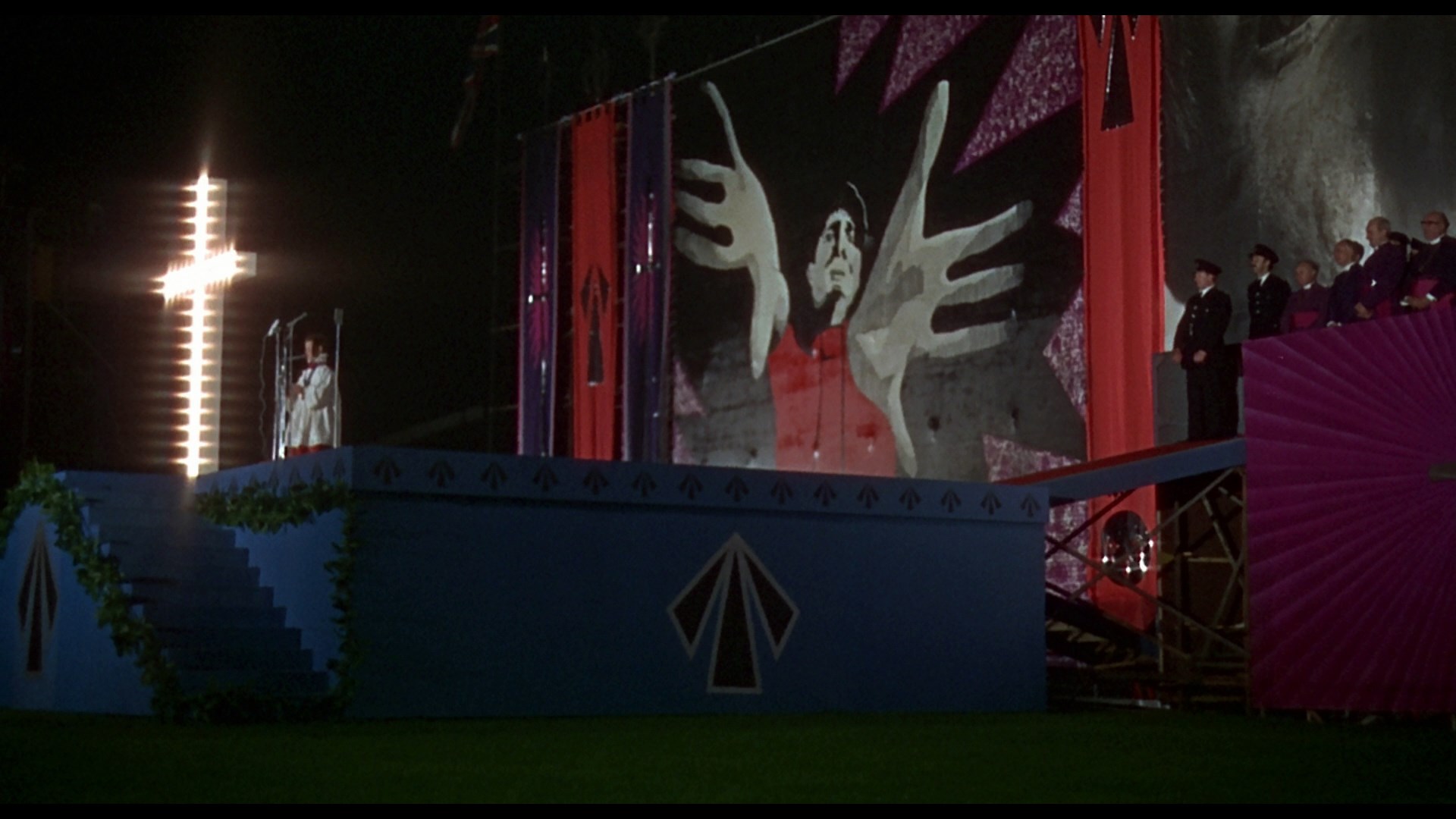
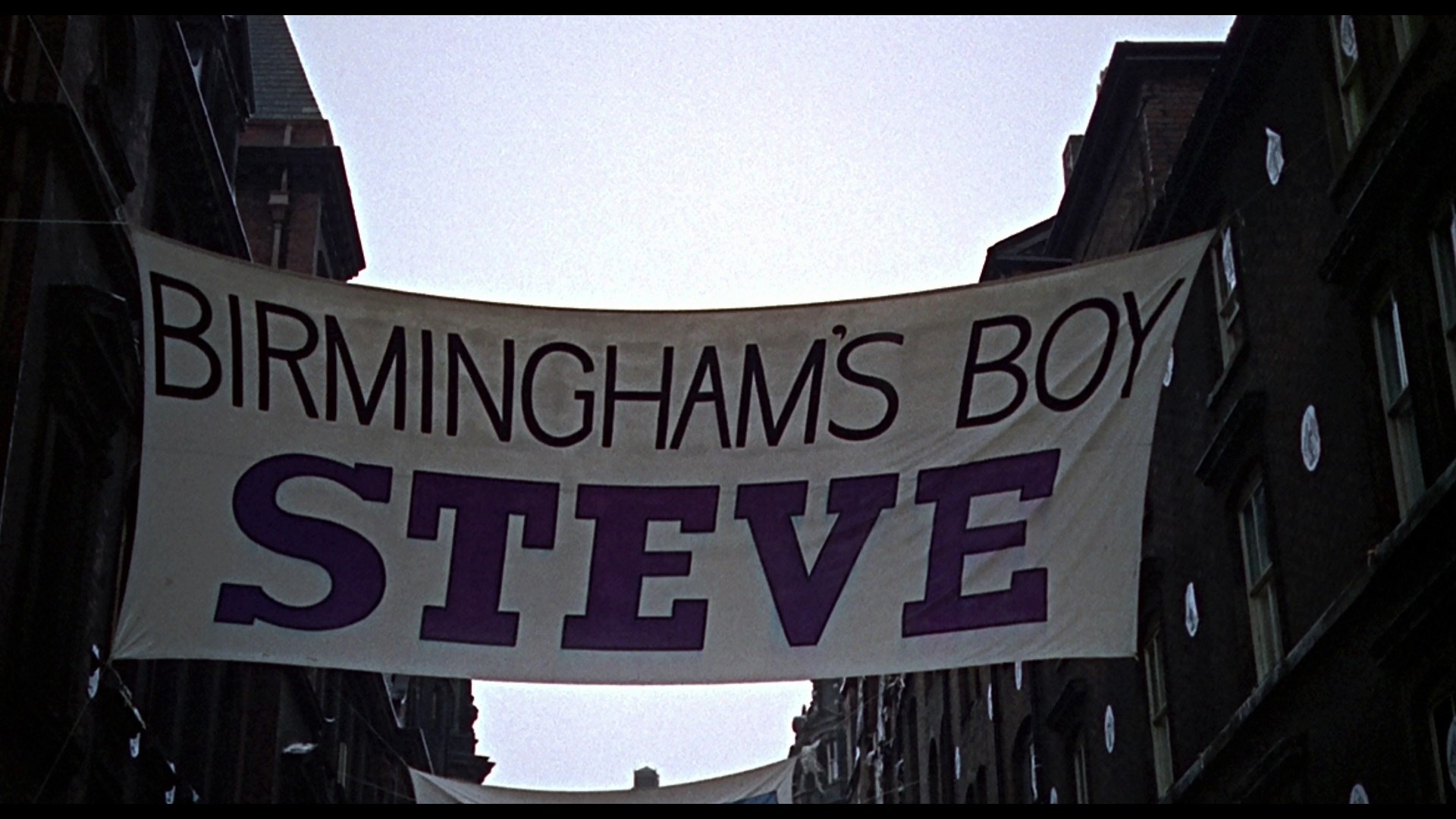
Updated review on July 6, 2022.



 films most people haven't seen, Peter
films most people haven't seen, Peter  Watkins' Privilege was the first theatrical feature from the controversial director of The War Game, the infamous banned TV post-nuke "documentary." With this film, Watkins turned his eye to a story of Britain "in the near future" where a pop idol, Steven Shorter (Jones, former lead singer of Manfred Mann), holds a powerful sway over the population thanks to his elaborate stage shows which feature him hauled out of a burlap prisoner's sack and into a cell where stage police beat him savagely while he sings songs pleading for freedom. Naturally, the teenagers eat it all up, much to the delight of his hyper-efficient PR team which has managed to turn his persona into a massive commercial industry manipulated by both church and single-party state. The game starts to change when pretty painter Vanessa (real-life supermodel Shrimpton) is brought in to create his portrait only to fall in love with the battered, bruised, manufactured idol, whose misery mounts when his handlers make him the centerpiece of a nocturnal festival honoring a country-wide Christianity week meant to covert over all of his susceptible young fans.
Watkins' Privilege was the first theatrical feature from the controversial director of The War Game, the infamous banned TV post-nuke "documentary." With this film, Watkins turned his eye to a story of Britain "in the near future" where a pop idol, Steven Shorter (Jones, former lead singer of Manfred Mann), holds a powerful sway over the population thanks to his elaborate stage shows which feature him hauled out of a burlap prisoner's sack and into a cell where stage police beat him savagely while he sings songs pleading for freedom. Naturally, the teenagers eat it all up, much to the delight of his hyper-efficient PR team which has managed to turn his persona into a massive commercial industry manipulated by both church and single-party state. The game starts to change when pretty painter Vanessa (real-life supermodel Shrimpton) is brought in to create his portrait only to fall in love with the battered, bruised, manufactured idol, whose misery mounts when his handlers make him the centerpiece of a nocturnal festival honoring a country-wide Christianity week meant to covert over all of his susceptible young fans.
 it's all about keeping young consumers in line. Watkins constructs the film as a narrated documentary (which creates a
it's all about keeping young consumers in line. Watkins constructs the film as a narrated documentary (which creates a  wonderful hall-of-mirrors effect for a story taking place in the future) but also unleashes a number of unforgettable, stylish set pieces, with Shorter's major performances being the standouts along with some hilariously biting television commercials. The two non-actor leads deliver appropriately low-key and sometimes awkward performances which actually work in the film's favor, and surprisingly, the soundtrack features plenty of standout pop tracks that could have been real hit singles with a bit more of a label push. In fact, if there's one quibble with the film, it's the omission of Jones' title song, one of the finest things he ever recorded, which kicks off the soundtrack LP but appears nowhere in the feature itself. Strangely enough, Jones eventually went on to become a born-again entertainer at the urging of Cliff Richard, which adds yet another layer of meaning to a film already operating on many, many levels at once.
wonderful hall-of-mirrors effect for a story taking place in the future) but also unleashes a number of unforgettable, stylish set pieces, with Shorter's major performances being the standouts along with some hilariously biting television commercials. The two non-actor leads deliver appropriately low-key and sometimes awkward performances which actually work in the film's favor, and surprisingly, the soundtrack features plenty of standout pop tracks that could have been real hit singles with a bit more of a label push. In fact, if there's one quibble with the film, it's the omission of Jones' title song, one of the finest things he ever recorded, which kicks off the soundtrack LP but appears nowhere in the feature itself. Strangely enough, Jones eventually went on to become a born-again entertainer at the urging of Cliff Richard, which adds yet another layer of meaning to a film already operating on many, many levels at once.  classic A Face in the Crowd, but that film's unlikely "happy" resolution makes it pale next to this film's far more ambiguous, haunting conclusion.
classic A Face in the Crowd, but that film's unlikely "happy" resolution makes it pale next to this film's far more ambiguous, haunting conclusion.  before Privilege finally appeared on home video after the studio struck a new print for retrospective screenings. In America the rights were licensed to Project X and distributed through the now-defunct New Yorker Films whose HD-sourced release looks excellent (albeit interlaced) and features some solid extras including "Lonely Boy," a half-hour 1962 documentary about Paul Anka that Watkins referred to heavily in the creation of his screenplay. Other extras include the theatrical trailer, a poster gallery, and a thick booklet containing a fascinating Watkins "self-interview" (shades of David Byrne) and two additional essays about the film.
before Privilege finally appeared on home video after the studio struck a new print for retrospective screenings. In America the rights were licensed to Project X and distributed through the now-defunct New Yorker Films whose HD-sourced release looks excellent (albeit interlaced) and features some solid extras including "Lonely Boy," a half-hour 1962 documentary about Paul Anka that Watkins referred to heavily in the creation of his screenplay. Other extras include the theatrical trailer, a poster gallery, and a thick booklet containing a fascinating Watkins "self-interview" (shades of David Byrne) and two additional essays about the film.
 preparing to charge into the fray, and 1961's The Forgotten Faces (18m53s), a look at a major Hungarian public revolt.
preparing to charge into the fray, and 1961's The Forgotten Faces (18m53s), a look at a major Hungarian public revolt.  Both feature glimpses of the genius soon to come with Watkins' first two features and make for an invaluable accompaniment to the main program. Finally the UK release contains a different, 28-page booklet featuring essays by film historian Robert Murphy and Watkins expert John Cook, a Watkins overview by William Fowler, a Paul Jones bio by the BFI's Vic Pratt, and a nice smattering of behind-the-scenes photos.
Both feature glimpses of the genius soon to come with Watkins' first two features and make for an invaluable accompaniment to the main program. Finally the UK release contains a different, 28-page booklet featuring essays by film historian Robert Murphy and Watkins expert John Cook, a Watkins overview by William Fowler, a Paul Jones bio by the BFI's Vic Pratt, and a nice smattering of behind-the-scenes photos.








